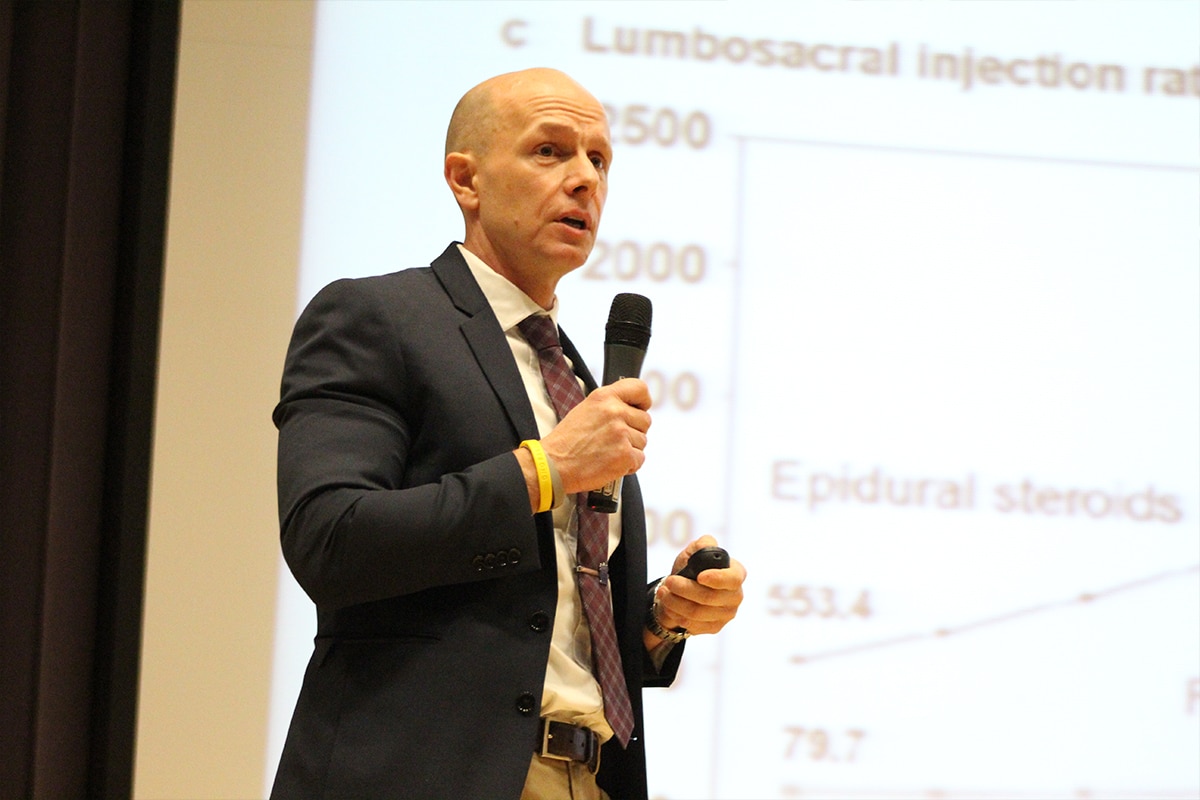If you ask Porter County Sheriff David Reynolds what his community’s number one problem is, he easily replies, “Drugs.” Heroin, an opioid, is chief among his concerns as it takes dozens of lives each year. On Thursday, Ivy Tech Valparaiso gathered medical, law enforcement, and other experts for a free Opioid Awareness & Wellness Seminar where they analyzed the epidemic and possible solutions.
Brandy Maurushes, a Life Coach Intern at Ivy Tech who is completing her Master of Social Work from Indiana University Northwest, organized the seminar. She previously worked in a Methadone clinic, which is where people addicted to opioid-based drugs can receive medication-based therapy. She learned how many people’s addictions start through using opioids to treat pain, and she set out to find ways to educate people on alternatives.
Click here to see more photos!
“Basically, what it all boils down to is successful aftercare, how you manage your pain,” Maurushes said. “This event is about educating people on natural alternatives to opioids, and how to manage their health and wellness through those methods.”
The event headlined five speakers who each offered a different perspective on the opioid crisis. Chuck Harris, Porter County Recorder and former Porter County Coroner, led things off with a summary of just how widespread the problem is. He also noted that while heroin is certainly the biggest single problem, individual addictions often start on a much simpler, innocent level.
“Valparaiso is an incredible place to live, but we also have this opioid problem that doesn’t get talked about nearly enough,” Harris said. “Eighty percent of people that start using heroin started their addictions through prescription opioids. So just arresting drug dealers isn’t going to solve the problem.”
Darren Earnshaw, a Physical Therapist at Merrillville Athletico, offered practical and physical solutions to managing pain – cutting off the need for opioids in the first place. He also shared research that shows that pain is very psychological. People’s brains often trick them into thinking they are in more pain than they actually are, and simple therapy and education about how the body and mind work can dramatically reduce pain.
Ivy Tech’s auditorium was packed nearly full. “We’ve got about 170 people here, and it’s great to see so many visitors,” said Kimberly LaBarge, Assistant Director of Marketing and Communications at Ivy Tech in Valparaiso. “None of these people have to be here, so I think the great turnout says a lot about how important this subject is to our community.”
While some speakers addressed how to prevent an addiction from ever forming, Todd Willis, Director of Prevention & Education at Valparaiso Porter-Starke Services, explored ways of helping people recover. One of the most proven avenues are Medication-Assisted Treatment (MAT) options, such as Methadone clinics. These help reduce withdrawal symptoms and allow for a gradual return to a healthy lifestyle.
“This is the gold-standard treatment for opioid abuse,” Willis said. “What I most want people to hear is that this treatment is not new—there’s 50 years of research into this standard of treatment. For some people, it not only works, it gives them their life back.”
After the presentations, attendees visited with vendors representing therapy and recovery organizations such as Narcotics Anonymous, Regional Mental Health Center, Vyto’s Pharmacy, and Porter-Starke. Ivy Tech in Valparaiso’s seminar gave community members the tools necessary to help others and be ambassadors for opioid awareness in the future.




